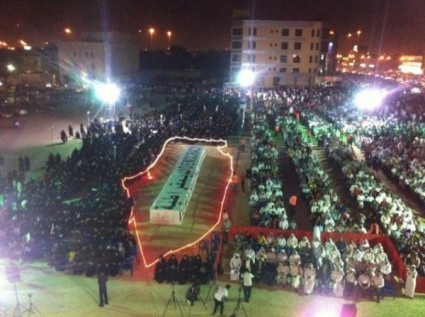Bahrain’s Funeral for Democracy Aprapos as West speaks to halt Middle East Democracy Movement

Bahrain Pro-democracy movement buries democracy after its assassination by US and ‘friends’
Embassy Protests and Middle East Unrest in Context
By Stephen Zunes – 17 September, 2012 – FPIF
It seems bizarre that right-wing pundits would be so desperate to use the recent anti-American protests in the Middle East—in most cases numbering only a few hundred people and (except for a peaceful Hezbollah-organized rally in Lebanon) in no cases numbering more than two or three thousand—as somehow indicative of why the United States should oppose greater democracy in the Middle East. Even more strangely, some media pundits are criticizing Arabs as being “ungrateful” for U.S. support of pro-democracy movements when, in reality, the United States initially opposed the popular movements that deposed Western-backed despots in Tunisia, Egypt, and Yemen, and remains a preeminent backer of dictatorships in the region today.
Meanwhile, Mitt Romney falsely accused President Obama of “apologizing” for what the Republican presidential nominee referred to as “American values” and of “sympathizing” with those who attacked diplomatic missions rather than promptly condemning them. (What apparently prompted this misleading attack was a tweet from the U.S. embassy in Cairo prior to the worst attacks reiterating U.S. opposition to “efforts to offend believers of all religions” and “the actions by those who abuse the universal right of free speech to hurt the religious beliefs of others.”)
What incited many of the protests was an outrageously offensive anti-Islamic movie produced by Christian extremists in California, but there is a lot more to the protests than this triggering event.
For years, the Christian right and Islamic right have sought to provoke extremism and hatred as part of an effort to seemingly validate the stereotypes of the other. As Hani Shukrallah remarked about the film in the leading Egyptian newspaper Al-Ahram, “The obvious, outward motive of such attempts is not difficult to discern: to show Muslims as irrational, violent, intolerant and barbaric, all of which are attributes profoundly inscribed into the racist anti-Muslim discourse in the West. And, it’s a very safe bet that there will be among us those who will readily oblige.”
The attacks on two U.S. consulate offices in Benghazi, which killed the U.S. ambassador and three other Americans in Libya, are far more significant, though these appear to have been the work of Ansar al-Sharia, an extremist Islamist militia which took advantage of a protest to launch their armed assault avenging the killing of a Libyan-born al-Qaeda leader by a drone strike in Pakistan. Ironically, the United States allied with these extremists in the armed uprising against the Gaddafi regime last year.
Indeed, last week’s tragedy in Libya should raise questions about the wisdom of backing such armed uprisings, even against a brutal dictator. In Egypt and Yemen, where dictatorships were overthrown largely through mass nonviolent action not supported by Washington, the worst damage protesters at the U.S. embassies could do was to seize parts of the grounds and burn the American flag. In Libya, where the dictator was overthrown in an armed revolution that was supported by Washington, two consulate buildings were destroyed and four Americans were killed in a coordinated assault with automatic weapons, mortars, and rocket-propelled grenades. Historically, autocratic regimes overthrown by armed struggle are far more likely to descend into violence and chaos (and/or a new dictatorship) than authoritarian regimes toppled through largely nonviolent methods.
In a country of barely 6 million people, more than 200,000 Libyans are armed members of militias outside the control of the Libyan government. Even though the recent Libyan elections appear to have been free and fair, and the winners largely consisted of moderates open to a democratic political system, the legacy of the war and the NATO intervention will likely remain a problem for some time to come.
In the rest of the region, where uprisings against dictatorships came largely in the form of unarmed civil insurrections, radical Islamists have been severely weakened, as the popular revolts demonstrated how U.S.-backed regimes could be toppled without embracing terrorism or extremist ideologies. The need to manipulate a hysterical reaction to an obscure, albeit offensive, film is indicative of just how desperate the far-right-wing Islamists have become in asserting their relevance. These extremists were able to stir up crowds in cities in more than a dozen Islamist countries with false claims that the film was a major Hollywood production which, like movies in Egypt and many other countries in the region, must have been subjected to review and approval by government censors before being released to the public.






























Add facebook comments
Kick things off by filling out the form below.
Leave a Comment